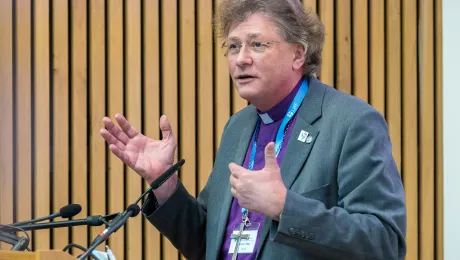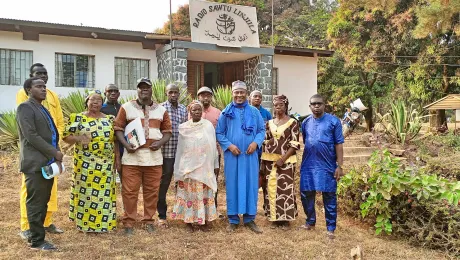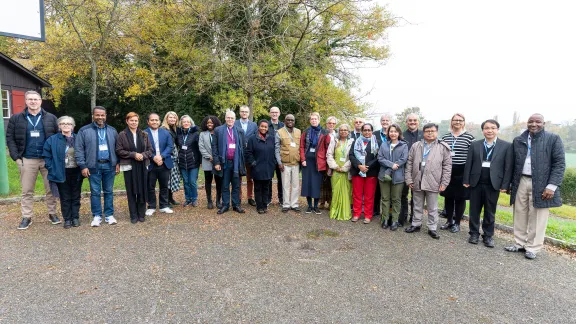
Participants in the Theological Education and Formation steering group meeting, 4-6 November, in Geneva, Switzerland. Photo: LWF/S. Gallay
Theological Education and Formation steering group sets priorities for 2025-2027
(LWI) – Leaders of theological institutions among The Lutheran World Federation (LWF) member churches worldwide have set networking priorities for the coming years based on pressing needs identified across all regions: eco-theology, spirituality, misleading theologies, and gender justice.
The Theological Education and Formation (TEF) network global steering group held its first in-person meeting, 4-6 November in Geneva, bringing together 21 representatives of theological seminaries, university faculties, academies and church units in all the seven LWF regions. Their 2025-2027 activities will include monthly online meetings, and development of joint online courses.
The Thirteenth Assembly called for stronger networking between theological institutions, affirming their crucial role of providing education and formation to support LWF member churches in responding to today’s challenges, noted Rev. Dr Eva Harasta, Program Executive for Global Lutheran Theology. “The TEF meeting has laid good groundwork for this in the coming years. It is our hope that through networking, many of the teaching institutions can support each other, and contribute to strengthening the Lutheran communion,” she added.
The steering group moderator Rev. Dr Kayko Driedger Hesslein, Dean of Studies at Lutheran Theological Seminary in Saskatoon, Canada, said one of the issues that clearly emerged from the meeting is the imbalance between access to resources globally. Accessibility to resources, she said, affects how theological institutions can facilitate mutual sharing and receiving. “I see this as a continual process of sharing, evaluation and conversation around ‘where am I in need right now and where do I have access right now?’”
How do we ground them [students] in Lutheran identity and education, and how do we make it contextually relevant?
Rev. Dr Kayko Driedger Hesslein, moderator, LWF Theological Education and Formation network
Hesslein also highlighted the global shift in theological education toward integrating knowledge with storytelling and “learning with our heart.” She stressed the value of sharing with her students the stories from other Lutherans around the world to help them understand their own Lutheran identity. “How do we ground them in Lutheran identity and education, and how do we make it contextually relevant? We're all asking those questions, and it's so nice to know that our seminary is not alone in trying to figure it out,” the TEF global steering group moderator added.
Eco-theology and climate justice
LWF’s sustained advocacy on the global climate crisis is part of a communion-wide initiative including theological material produced by several churches. Rev. Thomas Berbom, Senior Theological Advisor, Church of Norway, cited God’s Creation–our home, a liturgy by the Bishops’ Conference, on the encounter between Christian faith, creation and the climate emergency. The church also offers a course in eco-theology for ordained pastors. One of TEF’s role will be to gather such material and contribute to LWF’s online resources on climate justice, and promote initiatives like garden networks in campuses, inspired by the LWF youth-led climate justice projects and other initiatives.
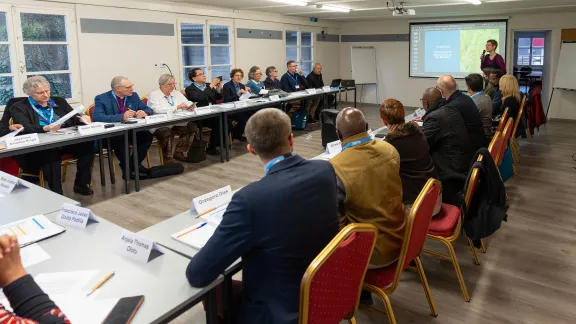
This was the first in-person meeting of the steering group. In the photo, Rev. Dr Eva Harasta, Program Executive for Global Lutheran Theology, leads one of the sessions. Photo: LWF/S. Gallay
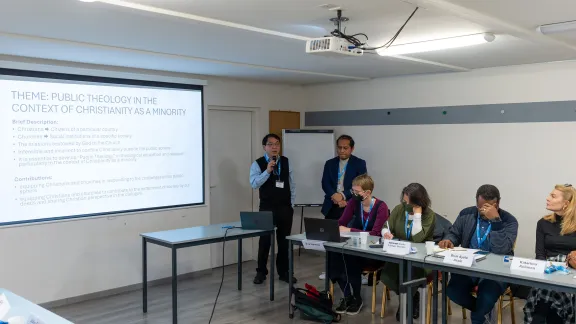
Rev. Dr Ho-Yin Kenneth Tsang (Hong Kong) (holding microphone) and Rev. Dr Binsar J. Pakpahan (Indonesia) presenting topics from the Asian region. Photo: LWF/S. Gallay
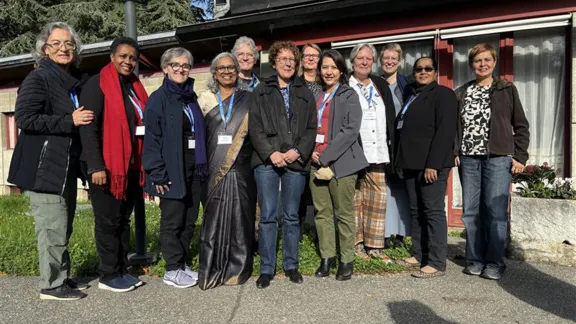
Women members of the TEF steering group and LWF staff at the meeting in Geneva. Photo: LWF/S. Harasta
Misleading theologies
The group discussed the need for clear strategies, definitions, criteria and practical tools on what constitutes misleading theologies and how churches can respond. “How do we make the gospel meaningful from our Lutheran understanding through theologies that liberate downtrodden people, such as the Dalits in Asia,” remarked Rev. Dr Songram Basumatary, Principal, Gurukul Theological College and Research Institute, in Chennai, India. It is important to focus on praxis-oriented approach focusing on the liberation of all people, he added.
Gender justice
The participants outlined strategies for promoting gender justice, including establishing a network of women faculty members, enhancing inclusion of women’s research in theological education and engaging men in gender justice work across all regions and varying contexts. Rev. Dr Ángela Trejo Haager, director of the Augsburg Lutheran Seminary (SEMLA) in Mexico City, Mexico, said resources on the rights of women and women’s ordination are critical for the seminary that also receives students from Chile, El Salvador, Honduras, Peru and Venezuela. In countries “where patriarchy is very pronounced, we would like to have a south-south dialogue with our Latin American-based theologies, and continue to be a prophetic voice for justice,” she said.
Spirituality, ecumenical theology and public witness
Strengthening awareness about ecumenical opportunities emerged as concerns across LWF’s regions. TEF’s resource collection will include materials on ecumenical dialogues to be shared on the LWF Learning Platform, and experience exchange for students, teachers and pastors. Training will also be developed to prepare students for public witness roles in their communities, benefitting institutions such as the United Lutheran Theological Seminary Paulinum in Namibia. The seminary’s rector Rev. Dr Daniel S. Ndemuweda, spoke of the goal “to make the theology of land, peace and justice part of our curriculum,” in a country where most of the land is owned by those in power, amid a growing gap between the rich and the poor.
Regarding spirituality, participants discussed whether the concern is Lutheran understanding of spirituality or the meaning of Lutheran spirituality. TEF will create a “spirituality group” for ongoing reflection, including online and resilience-based approaches. This initiative aims to support the spiritual growth and formation of both clergy and lay leaders across a diverse theological landscape.
In addition to these important topics, the TEF global steering group will develop models for youth participation in the network’s decision-making processes to foster intergenerational justice.
